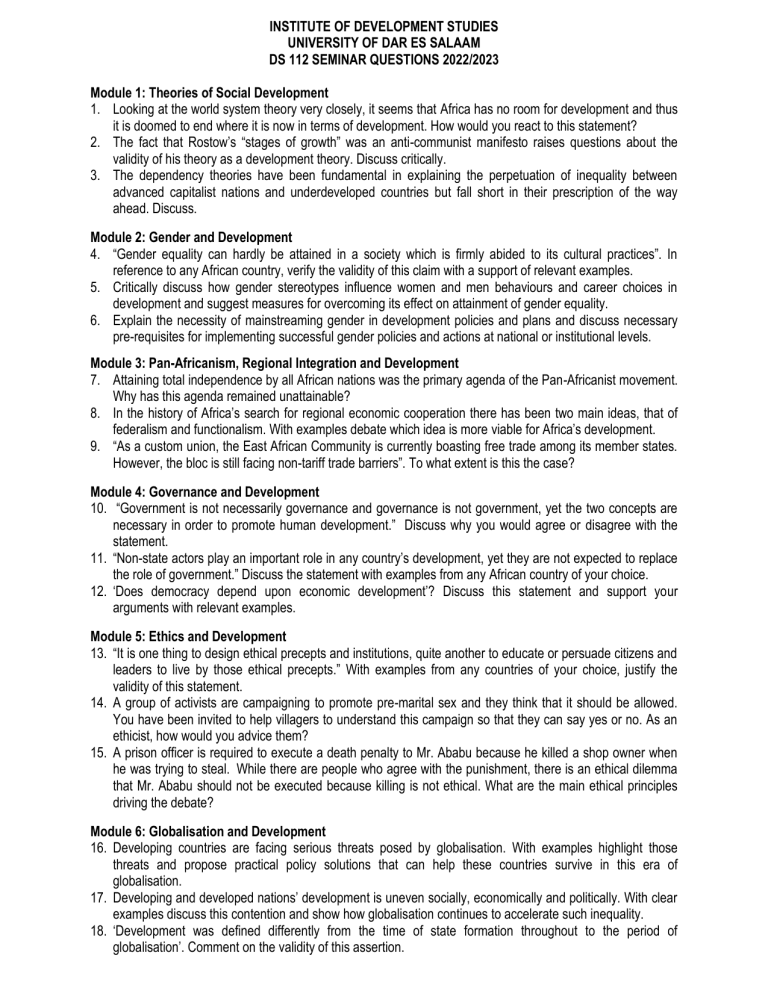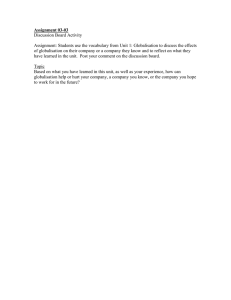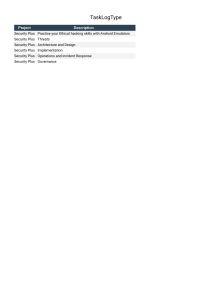
INSTITUTE OF DEVELOPMENT STUDIES UNIVERSITY OF DAR ES SALAAM DS 112 SEMINAR QUESTIONS 2022/2023 Module 1: Theories of Social Development 1. Looking at the world system theory very closely, it seems that Africa has no room for development and thus it is doomed to end where it is now in terms of development. How would you react to this statement? 2. The fact that Rostow’s “stages of growth” was an anti-communist manifesto raises questions about the validity of his theory as a development theory. Discuss critically. 3. The dependency theories have been fundamental in explaining the perpetuation of inequality between advanced capitalist nations and underdeveloped countries but fall short in their prescription of the way ahead. Discuss. Module 2: Gender and Development 4. “Gender equality can hardly be attained in a society which is firmly abided to its cultural practices”. In reference to any African country, verify the validity of this claim with a support of relevant examples. 5. Critically discuss how gender stereotypes influence women and men behaviours and career choices in development and suggest measures for overcoming its effect on attainment of gender equality. 6. Explain the necessity of mainstreaming gender in development policies and plans and discuss necessary pre-requisites for implementing successful gender policies and actions at national or institutional levels. Module 3: Pan-Africanism, Regional Integration and Development 7. Attaining total independence by all African nations was the primary agenda of the Pan-Africanist movement. Why has this agenda remained unattainable? 8. In the history of Africa’s search for regional economic cooperation there has been two main ideas, that of federalism and functionalism. With examples debate which idea is more viable for Africa’s development. 9. “As a custom union, the East African Community is currently boasting free trade among its member states. However, the bloc is still facing non-tariff trade barriers”. To what extent is this the case? Module 4: Governance and Development 10. “Government is not necessarily governance and governance is not government, yet the two concepts are necessary in order to promote human development.” Discuss why you would agree or disagree with the statement. 11. “Non-state actors play an important role in any country’s development, yet they are not expected to replace the role of government.” Discuss the statement with examples from any African country of your choice. 12. ‘Does democracy depend upon economic development’? Discuss this statement and support your arguments with relevant examples. Module 5: Ethics and Development 13. “It is one thing to design ethical precepts and institutions, quite another to educate or persuade citizens and leaders to live by those ethical precepts.” With examples from any countries of your choice, justify the validity of this statement. 14. A group of activists are campaigning to promote pre-marital sex and they think that it should be allowed. You have been invited to help villagers to understand this campaign so that they can say yes or no. As an ethicist, how would you advice them? 15. A prison officer is required to execute a death penalty to Mr. Ababu because he killed a shop owner when he was trying to steal. While there are people who agree with the punishment, there is an ethical dilemma that Mr. Ababu should not be executed because killing is not ethical. What are the main ethical principles driving the debate? Module 6: Globalisation and Development 16. Developing countries are facing serious threats posed by globalisation. With examples highlight those threats and propose practical policy solutions that can help these countries survive in this era of globalisation. 17. Developing and developed nations’ development is uneven socially, economically and politically. With clear examples discuss this contention and show how globalisation continues to accelerate such inequality. 18. ‘Development was defined differently from the time of state formation throughout to the period of globalisation’. Comment on the validity of this assertion.


